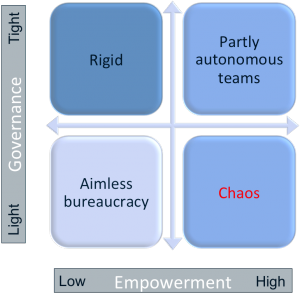Introduction
In part 1 of this article we looked at the challenges caused by geographical distribution of teams and team members. In this second part we will look into the challenges that are caused by language and culture differences.
Separation by language
Most of my English-speaking colleagues will admit, that rather few of English language native speakers are able or feel very comfortable to speak a foreign language at working proficiency. In my opinion that is because they don’t have to. Nowadays English is the lingua franca of technology. And it is the first foreign language taught in many countries around the world. This helps us in international settings, as it is quite clear that English will be used as communication language most of the time. So why do we actually have a separation by language, if we all use the same one? Let’s start with a story.
At some point in time I took over a team of testers in the United States. Having learned English from the age of 8 and having experience in international projects, I wasn’t afraid that language would be a problem. Until I found that we definitely had a different understanding of the little word “should”. This is because it translates into German as “sollen”. In German, however, that word carries a range of meanings with regard to the degree of obligations. They range from “shall” when used in indicative form to “should” when used in subjunctive. Knowing that the subjunctive form is also used to tell someone that he “shall do something” in a friendly way, you see we were headed for trouble. And even being aware of that in theory, it took me some tasks and initiatives not being done to adjust my wording to that of my testers. On the other hand, over time, my testers were nice enough to ask for clarification.
So the problem is that the majority of people we deal with are not English native speakers, just like me. And even though one can attain a quite solid command of a foreign language, our mother tongue will influence most of us when using a foreign language. At this point in time I apologize for my English I force on native speakers with this article.
Language issues can become even more complicated, when the translation becomes complicated to impossible. A look at the word “you” shall serve as an example. When translating this word into German we have to derive from context, whether it is singular or plural. Ok, that is easy. However it could be the polite form of addressing a person, which is actually needed in German. And as we try to translate that into Vietnamese, we need even more information. Because at that point we have to know if we are addressing a male or female person and whether the person is way younger, more or less the same age or definitely older than the person speaking. And, as far as I know, that is only the simple way you are taught when you start learning Vietnamese.
Language can pose other interesting problems as well.
In order to receive a rather large public project, an international group of employees had to work on a tender document. Being the responsible QA-Manager I was tasked to deal with the quality relevant parts. I thought: “No problem, done that before”. Until I saw the document which described the mandatory content. It was written in Mandarin Chinese. So a no-read document for me. Well, having a significant footprint in Asia-Pacific I was lucky to have colleagues being able to translate that for me. Or so I thought, as one translated a chapter heading as “System Testing and Acceptance Plan”, while another on claimed it would translate to “Acceptance Procedures and Go-Live Planning”. Not that I could not write about both subjects, but there is a significant difference. Knowing that my English-written comments have been translated back to Mandarin, I actually wonder what message arrived at the potential customer and our implementation partner.
Language influences thinking and behavior. From a large comparative study we know that the language someone speaks will influence his or her economic behavior like savings rate (see this brilliant talk by Keith Chen). And this influence is measurable and significant, even if the people compared live and grew up within the same culture, a factor strongly affecting values and behavior. So it is save to say that it will also influence our behaviour when developing software.
Separation by Culture

Beyond the influence of language lies the influence of culture. Culture is deeply ingrained in our behavior and governs our expectations; our social interactions and the way we manage people. In Gert Hofstede’s work “Culture’s Consequences” we can read a lot about the different dimensions he and his colleagues used to categorize the different cultures. I will only mention power distance and individualism, as these are the ones I personally could observe and attribute different behavior to it.
A software company developed a part of their software portfolio in Vietnam. In a bid to use the existing infrastructure while leveraging the cost advantage, a small QA organization was built up there. Due to the fact that this was my first time recruiting in Asia, I did not pay that much attention to the actual job titles, as I was used that they were rather unimportant as long as the salary and job actually matched. And since it was also no problem budget-wise, I ended up with two similarly experienced and similarly paid testers. I however had overlooked that one of them was designated as junior tester, while the other one was designated as tester. Not only did the “regular” tester believe that he was therefore the other’s boss. This was also accepted by the “junior”. The result of that was that in our regular meetings only the “regular” tester would talk to me and summarized also the results and issues of the “junior”. It cost me months to straighten that out, and it was only possible by actually “promoting” the “junior”.
The importance of the job title is related to the higher power distance in Vietnam (and generally in Asian countries). To me this came especially surprising, as Austria is actually known as a country, where titles are important. In business life, however, the job titles have lost their importance in most settings. This ignorance of mine caused me quite some headaches, especially as there was no underlying reason for it.
The power distance also is a measure of the importance of direction by the manager. To managers, who are trained in formulating goals and relying then on the professionalism of their employees, the expectation to define the “how” very clearly as well, is highly surprising.
But besides the higher importance of leading roles, teamwork and team relations have to be viewed differently in different cultures.
A company I worked with had a rather typical MBO scheme, where the employees received a year-end bonus based on the company success and their personal achievements. When we rolled that out to our Vietnam subsidiary, it became clear very quickly, that the personalization of the goals made the employees uneasy. They were used to see everything as a team effort and also worked that way. Harmony within the team was a keyword I heard most often in that context. To them the harmony within the team and the teamwork itself was at risk by personalized goals and bonuses. We rather quickly decided, that the personalized part was minimized and replaced most of the objectives by team goals.

The above example illustrates nicely the lower degree of individualism and the higher importance of the collective, which we can observe in most Asian countries. Especially with regard to bonus schemes and management techniques it is important to realize that the underlying focus on one person is counterproductive in these settings.
In order to tackle the challenges posed by language and culture separation I suggest a combination of organizational and methodological measures as well as personal immersion in the cultures and languages involved. To me it proved valuable to learn at least a bit of Vietnamese, as the structure of the language and the contact with other Vietnamese people outside the work context helped my understanding of my team greatly. And it definitely helped with regards to respect from my team, as they valued my effort highly, even though it was very poor. Also inter cultural trainings help in that matter to avoid making the most common mistakes.
To tackle the language separation in development the use of models helps greatly as they are language independent.
Organization-wise I can only suggest creating highly autonomous groups within a clear governance framework. Besides reducing the frictions caused by the separation in location and time zone, it allows the teams to work in their own language and according to their own team rules and cultures within a wider setting of a global framework. The lowering of misunderstandings and frictions will also improve the trust between the different teams. Finally ensure that your management methods and structures are suitable for the culture you work in. In Figure 2 you can see a diagram depicting the influence of governance and team empowerment on your overall work environment. Rather obviously it is with the partly autonomous teams, where the magic happens.
To close this article I leave you with the conundrum I haven’t been able to work out in the last years. Whereas the culture in most Asian countries is way more team oriented as in Europe and the United States, the typical agile setting of self-organizing teams doesn’t work that well. More or less in all the settings I worked in it needed a (power distance compatible) lead to structure the work and guide the team. And I would be very happy about reader’s comments and experiences relating to that.
About the author
Bernhard Burger works in the IT sector for nearly two decades. He has held leading positions in the areas of financial services, telecom and software development. In recent years he successfully built up international quality organizations and focused on their professional growth and effectivity. In 2014 he founded Quality Advantage, a consultancy focused at the idea of the quality over the whole lifecycle.